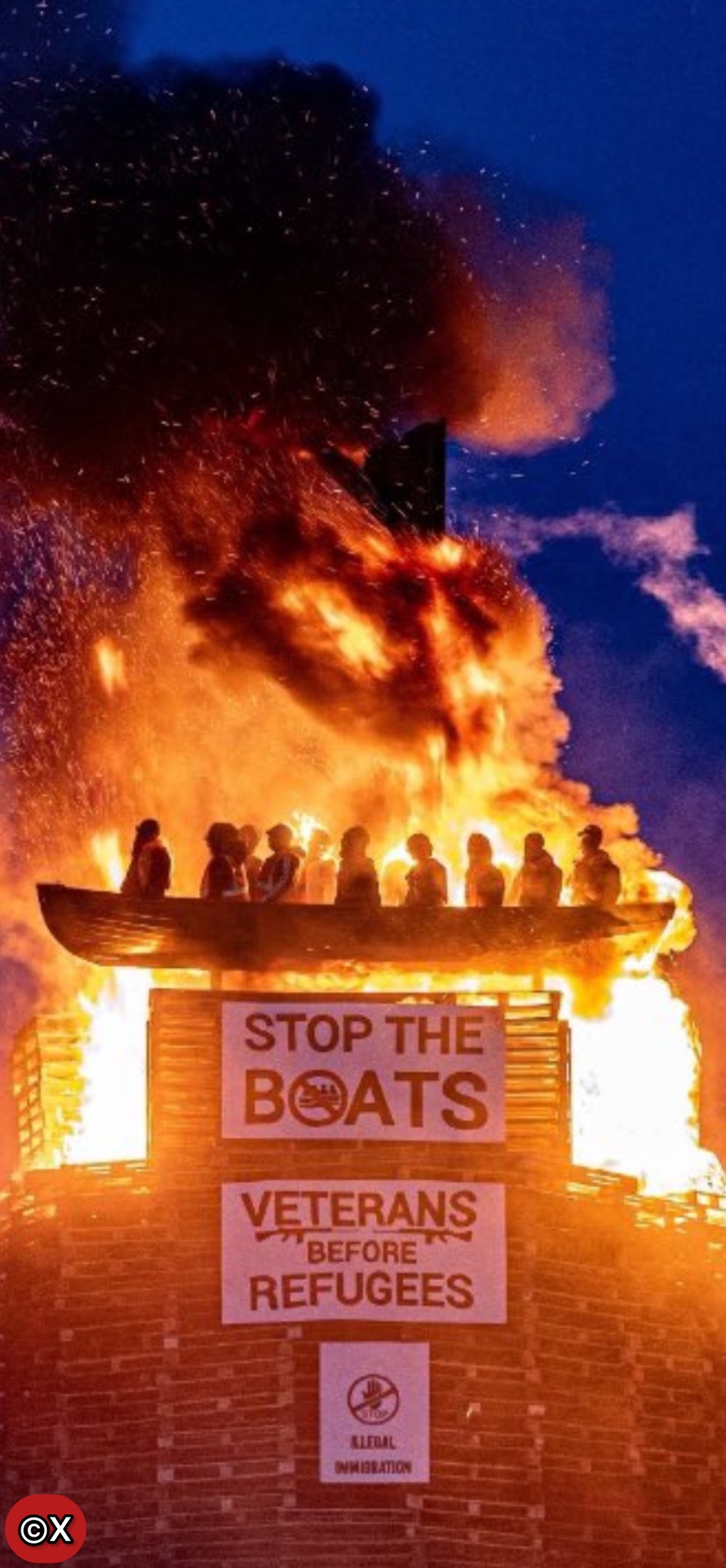A bonfire featuring a display of refugees in a boat was lit in Moygashel, Northern Ireland, on Thursday night and is being investigated by police as a hate incident following widespread condemnation from church leaders and politicians.
The model, which showed a small boat containing more than a dozen life-sized mannequins wearing life jackets, was set alight atop the traditional Eleventh Night bonfire in the County Tyrone village, approximately 40 miles west of Belfast. Signs beneath the boat read “stop the boats” and “veterans before refugees”.
Church of Ireland Archbishop John McDowell condemned the display as “racist, threatening and offensive”, stating it had “nothing whatsoever to do with Christianity or with Protestant culture and is in fact inhuman and deeply sub-Christian.
Police Investigation Launched
The Police Service of Northern Ireland (PSNI) confirmed they had received multiple reports about the bonfire and its contents. “Police have received a number of reports regarding the bonfire in Moygashel and the material that has been placed upon it. Police are investigating this hate incident,” a spokesperson said.
The force added: “Police are here to help those who are or who feel vulnerable, to keep people safe. We do this by working with local communities, partners, elected representatives and other stakeholders to deliver local solutions to local problems.”
However, police noted they could “only do so within the legislative framework that exists”, explaining why they did not intervene before the bonfire was lit despite calls for the display’s removal.
Political Condemnation
Sinn Féin Assembly member Colm Gildernew branded the display “vile” and “deplorable”, calling it “an absolutely disgusting act, fuelled by sickening racist and far-right attitudes”.
“This is a clear incitement to hatred and must be removed immediately,” Gildernew said. “Those who come to our island to make it their home are not the enemy. They are our friends, our neighbours and are welcomed, cherished and valued by the vast majority of people here.”
First Minister Michelle O’Neill, whilst not directly referencing Moygashel, said Northern Ireland had seen “openly racist displays that are sickening and deplorable”, adding: “It’s time for leadership to be shown.”
SDLP leader Claire Hanna described the display as featuring “intricate effigies of human beings, for burning”, questioning: “Who is this for?”
Church Leaders Unite in Opposition
Archbishop McDowell quoted scripture in his condemnation, citing Leviticus 19:34: “The stranger who resides with you shall be to you as one of your citizens; you shall love him as yourself, for you were strangers in the land of Egypt.”
He expressed hope that “the many people from other countries, who live in that area, and who contribute so much to the economy and to the diversity of Dungannon, can be reassured that it does not in any way represent the feeling of the vast majority of their neighbours.
Dr David Clements, senior Methodist minister, told BBC Radio Ulster that the effigy should be removed before the bonfire was lit, though this call went unheeded.
Defence from Organisers
Moygashel Bonfire Committee defended the display, stating it “should not be seen as ‘racist, threatening or offensive'” and claiming it was “expressing our disgust at the ongoing crisis that is illegal immigration.
The committee’s stance found support from loyalist activist Jamie Bryson, who described the display as “artistic protest”. He posted on social media: “Every year Moygashel bonfire combines artistic protest with their cultural celebration. Their yearly art has itself become a tradition. This year the focus is on the scandal of mass illegal immigration.”
Controversial History
The Moygashel bonfire has become known for controversial displays in recent years. A mock police car was burnt atop the bonfire last year, whilst in 2023, a boat designed to represent the post-Brexit Irish Sea economic border was torched.
An Irish tricolour flag was also placed on this year’s bonfire alongside the refugee boat display, continuing a tradition of burning symbols associated with Irish nationalism.
Cultural Context
Bonfires are lit annually on the Eleventh Night in unionist areas across Northern Ireland to usher in the Twelfth of July, which commemorates the Battle of the Boyne in 1690 when Protestant King William III defeated Catholic King James II.
Whilst most of the estimated 300 bonfires pass without incident, several have become contentious due to the placing of flags, effigies and election posters on the structures before ignition.
Chief Constable Jon Boutcher said in a general statement about the weekend’s events: “It is vital that in marking these events, we do so in a way that respects the backgrounds and cultures of everyone who share these neighbourhoods. There is no place for hate or intimidation — only space for celebration that welcomes and celebrates not divides.”
Wider Context of Tensions
The incident comes after parts of Northern Ireland were gripped by anti-immigrant rioting last month amid tensions surrounding a recent influx of people from Eastern Europe. Recent reports suggest increasing cooperation between anti-immigrant figures in the Republic of Ireland and loyalist groups in Northern Ireland.
Patrick Corrigan, Amnesty International’s Northern Ireland director, said it was “shameful” that the “despicable display of hate” had been allowed to proceed, adding it represented “a chilling pattern of escalating hostility”.
The Northern Ireland Fire and Rescue Service took two hours to extinguish the blaze after it was lit at approximately 10:30pm on Thursday. Three fire appliances and one water tanker attended the scene, with the fire finally extinguished at 12:33am using one jet and four hose reels.
Political activist Jack Dart suggested the image of the burning boat could represent a “turning point” in immigration debates, stating: “This image already feels like a turning point, because it captures something we’ve been sleepwalking towards for years.
Follow for more updates on Britannia Daily



